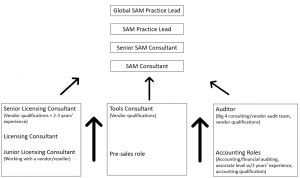Should ITAM job titles be standardised?
This guest article was contributed by Geoff Worsely, Veracity Cubed.
Is the SAM industry unique? There are apparently no recognised experience requirements or career progression ladder, and there are a multitude of ITAM job titles that lump people with a few months’ worth of experience together with people who have several years of experience.

I have been in a number of different roles over the years from end-user tool administration (which had a posh title of “…. Manager”), Pre-sales, Risk Manager, and more – but in effect I was doing broadly the same role – Software Asset Management from a technical side, not from a licensing side.
When you look at other industries – accountancy for example, they have a series of entrance exams and then promotion opportunities as you progress and gain experience. It’s the same in the Big 4 consultancies, you start as a Graduate or an Associate, pass some exams, get more experience and there is a documented process to achieve promotion.
Within the SAM industry there are a few good qualifications CSAM, PITAM, ITIL etc., but these can only cover the base layer of SAM. There are also a few vendors who offer some training, but the reality is that only experience can answer the questions ITAM professionals face.
Do a few qualifications provide a recruiter with the necessary information to put forward a CV for a role? No – but it doesn’t stop a university degree often being a minimum requirement. Wouldn’t it be nice as an end-user to know where I am in the industry against my peers, or for a recruiter to be able to look through LinkedIn and recognise who they should/shouldn’t contact about a £30,000 a year SAM Analyst role.
Types of experience
Now it gets a bit more complicated. Imagine there are two candidates who both have recognised qualifications and 4 years’ experience in an end-user role, who is the best fit – the person working in a multi-national but only looking after one or two vendors – or the person working in a small company where they were looking after a toolset, reporting, and their top 10 vendors? The difficulty in answering this shows that not every type of experience is right for every type of role.
As an employee it would be great to know what base level experience is required to reach the next level in the industry. At the moment, there is no consistency across organisations, and there have been times when I changed my job title to be a little bit different. Due to the lack of standardisation in the job titles and specifications, it is very difficult for companies who are recruiting to determine a salary level and let’s not even get into the subject of regional variations in salaries!
Perhaps it would be possible to apply the SFIA (Skills Framework for the Information Age) methodology, but SAM isn’t as broad as IT and, to make it more difficult, in some cases can be generic and in others very specific.
Defining the path
This is an extract of a model that I have been working on, looking at the consultancy rather than end-user perspective.

Let’s look at what’s typically expected in those higher-level roles:
SAM Consultant
They need a good working knowledge of data manipulation, a good understanding of the various methodologies to extract data from tools – and how to validate its accuracy. Also, a working knowledge of 3 or 4 Tier 1 vendor licensing models.
Senior SAM Consultant
Building on the previous skillset, a senior SAM consultant would need an addition 1-2 years’ experience, be comfortable presenting results to customers, and understanding the various options available to customers.
SAM Practice Lead
This level would require, in addition to the preceding skills: multiple customer engagements at a national level, ability to communicate latest industry trends, and be able to demonstrate pros/cons of different offerings – including cloud.
Global SAM Practice Lead
At this level, the practitioner would require a minimum of 5 years of consulting, experience across multiple projects, team management, working with customer stakeholders, and industry qualifications.
Working Together
How can the industry work together to standardise job titles and roles? As an employer, I want to offer something slightly different, perhaps I want someone with BI Reporting and Dashboard Development Skills. Or, the employer might be a hosting company with a heavy requirement on SPLA or development licensing? The key skills are still applicable!
A SAM Analyst is unlikely to have the necessary skills to present to CEOs or garner Stakeholder Support but will likely possess the skills to generate monthly reports suitable for CEOs or Stakeholders with a little explanation.
So far, we have looked at the career progression within the SAM industry but what if you want to get into, or out of, SAM…though why anyone would ever want to get out of the SAM industry defies logic!
Can a Procurement specialist come into SAM and, conversely, could a SAM person enter into Procurement? Yes, I believe both can move either way, it’s certainly an option.
As you move higher through the roles, perhaps you are a Consultancy Lead, that role is likely to have the necessary skills to head a SAM team in an end-user role but, conversely, a SAM Manager may not have the necessary skills to head a SAM Practice in a consultancy company. The roles are not necessarily totally interchangeable.
A final thought
Is the SAM Industry so varied in terms of the skills and knowledge required that it is simply not possible to pigeonhole people? I’d be really interested to hear your thoughts and experiences in this area – what do you feel needs to be done to make it easier to find and fill ITAM job roles?
Further Reading:
2019 Salary & Skills Survey – https://marketplace.itassetmanagement.net/2019/06/07/2019-itam-salary-and-skills-survey-the-results/
Related articles:
- Tags: ITAM job titles · SAM job titles

In the 30+ years at my current employer, I’ve been and still am almost solely responsible for procurement and managing software assets and licensing for well over 200 vendors (thousands of distinct product lines), responding to vendor audits, working with SAM managed service providers, maintaining and operating various deployment, inventory & reporting tools (with very little training) … I could go on!
Not to mention all the non-ITAM things I’ve done or do, which now includes budget management for the whole of our IT department and project work on a replacement for our ITSM tool.
I hate filling out any forms where I have to describe my job, let alone pick the most suitable job title from a list. Sometimes I just say that I work in local government. That won’t help me get another role in ITAM though, will it?
I enjoyed your article Geoff. Across countries SAM jobs come with an array of titles. In one state the same issue exists. it would nice to see some similarities. I totally agree on the college degree requirement. How would it help me with a SAM job. It won’t. keep up the good work!!
Hi Mike, yes, I agree, for those in existing roles it’s very difficult and I’ve had similar situations where a role constantly develops and evolves.